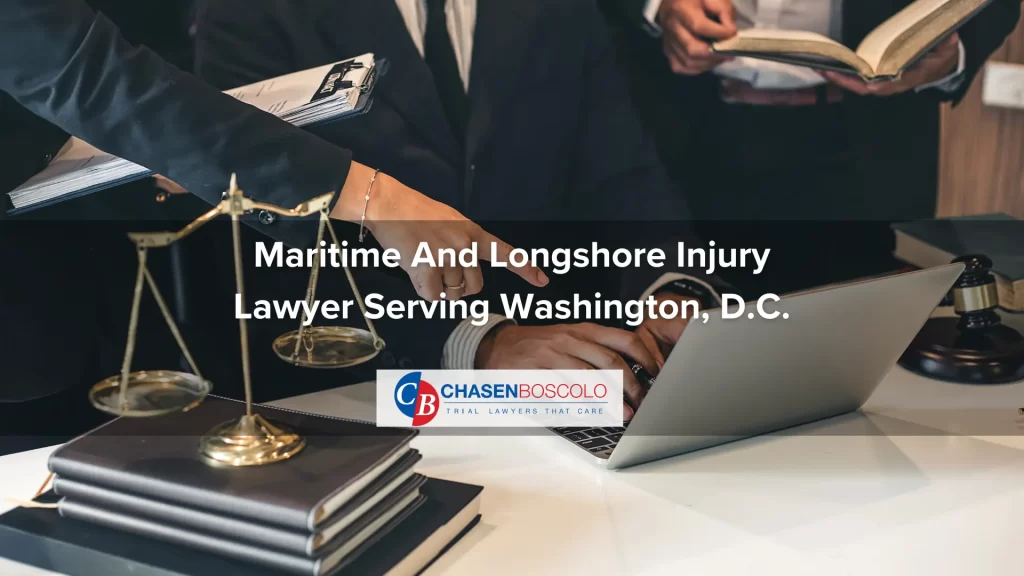
According to a 2013 report released by the Center for Disease Control (CDC), certain offshore workers are seven times more likely to suffer fatal injuries than other workers. Due to the dangerous nature of the industry, maritime workers often find themselves coping with life-changing or catastrophic injuries.
If you have suffered serious injuries, you may face exorbitant medical expenses, lost wages, and the possibility of not being able to return to work again. You do not need to face these challenges alone. Get in touch with a lawyer as soon as possible to discuss your options.
Your specific work role and how your injury occurred will determine what course of action you are able to take. An experienced lawyer can help you understand your options under the Jones Act, Longshore and Harbor Workers’ Compensation Act (LHWCA), or general maritime law.
The team at CHASENBOSCOLO have been fighting to help injury victims for over 30 years. We have recovered hundreds of millions of dollars for clients who needed it most and we are ready to help you. To discuss your situation with one of our maritime and longshore injury lawyers, call (301) 220-0050 today.
Do I Need a Maritime and Longshore Injury Lawyer?
In the aftermath of an injury, hiring a lawyer is the best way to protect your rights. Soon after an accident, it is likely that you will be contacted by numerous people to discuss what occurred and what you plan to do. If you’ve been injured offshore, the owner of the vessel may attempt to discourage you from filing a claim.
Additionally, when negligence is involved in your case, the insurer for the at-fault party may attempt to discuss the details of the incident with you. Keep in mind the at-fault party’s insurer does not have your best interest at heart. Often, in attempts to devalue your claim, they will try to shift some of the blame for the accident onto you. As such, you should not provide any statement for them and let your lawyer handle correspondence for you.
With the guidance of a skilled injury lawyer, you can be confident that the settlement or benefits that you are offered for your injury match the physical and financial struggle that you face. Many insurers are quick to offer a settlement but, unless a lawyer is overseeing your case, this settlement will almost always be far below the amount that you deserve.
Why Hire CHASENBOSCOLO to Handle my Case?
At CHASENBOSCOLO, our main focus is on helping clients. Our lawyers know that when you reach out to us for assistance, you are going through an exceedingly difficult time. By listening to you, evaluating the facts of your case, and pursuing all available options, we want to help you gain some control over your situation and make life feel less uncertain.
Founded in 1986, our team of 25 lawyers and 90 legal professionals have over 100 years of combined experience achieving excellent results for our clients. We have won hundreds of millions of dollars for our efforts both in and out of the courtroom.
When we take your case, it doesn’t matter to us if your claim is worth 200,000 dollars or 2 million dollars; our lawyers are going to give your case their full attention and help you recover the amount that you deserve. Our focus on positive legal outcomes and client service is designed to make sure that you are understood, supported, and have access to the resources that you need.
Maritime and Longshore Injury Cases We Handle
 A workplace injury can impact you for the rest of your life. If you are coping with a maritime or longshore injury, the team at CHASENBOSCOLO can help. Some commonly reported injuries include:
A workplace injury can impact you for the rest of your life. If you are coping with a maritime or longshore injury, the team at CHASENBOSCOLO can help. Some commonly reported injuries include:
- Sprains
- Muscle Strains
- Lacerations
- Fractures
- Burn Injuries
- Neck Injuries
- Head Injuries
- Nerve Damage
- Traumatic Brain Injuries (TBIs)
- Spinal Cord Injuries
- Paralysis
- Soft Tissue Injuries
- Internal Organ Damage
The Longshore and Harbor Workers’ Compensation Act (LHWCA) provides payment to workers injured on the job. LHWCA benefits include compensation for a variety of expenses, including medical treatment, vocational rehabilitation, and survivor benefits to dependents if a worker suffers fatal injuries. Under the LHWCA, the term injury can also apply to occupational diseases, illnesses, and hearing loss caused by employment.
In order to be covered, injuries must occur on navigable waters or nearby areas, including docks, piers, wharves, terminals, and areas used for unloading and loading seafaring vessels. Traditional maritime employees like longshore workers, ship repair workers, shipbuilders, ship-breakers, and harbor construction workers are all covered under the LHWCA. Additionally, non-maritime workers may be covered if injured while performing work duties on navigable waters.
Conversely, the Jones Act is a fault-based system which means that, unlike traditional workers’ compensation systems, workers must prove that the owner of the vessel or their employer was in some way negligent. Also, unlike the LHWCA, the Jones Act mainly provides coverage to seaman working aboard a vessel. Most people covered by the Jones Act spend at least a third of their working hours aboard a vessel.
If you have been injured, determining which law you will pursue compensation under is key. A lawyer from CHASENBOSCOLO can investigate your case to determine which act will be applicable to you, and help you along the path towards compensation.
Frequently Asked Questions
If you’re injured, the maritime and longshore injury lawyers at CHASENBOSCOLO can help you understand your rights, the type of compensation you are owed, and what your options are moving forward. Read over some of our FAQs and get in touch with us today to discuss your situation in more detail.
What are Maintenance and Cure?
Maintenance and cure compensation are “no-fault” benefits. This means that no matter if your injury occurred because of your employer’s negligence or not, employees injured offshore are entitled to them. Maintenance covers employees’ basic expenses such as shelter, bills, and food. If you are injured offshore, cure covers your injury-related medical expenses. Cure can cover expenses that span a variety of medical needs such as emergency treatment, diagnostics, hospital stays. Pharmaceuticals, and in-home care service.
What is Unseaworthiness?
Ship owners have a duty to provide a well-maintained and safe vessel for their employees. If the vessel has defective equipment and cannot be used as intended, it might be deemed unseaworthy. Though proving unseaworthiness is not the same as proving negligence, it is similar. With an unseaworthiness claim, an injured seaman only needs to prove that an element of the vessel was unsafe and ultimately led to their injury.
What Should I Do After an Injury?
If you’ve been injured in a maritime or longshore accident you should seek medical attention as soon as possible. Though some workers’ compensation benefits require workers to visit certain medical providers, you are permitted to choose your doctor. Keep in mind that many injuries have delayed symptoms, so do not shrug off your injuries. In addition to medical treatment, document the conditions that led to your injury. If a defective piece of equipment, unsafe structure, or other hazard created unsafe conditions, make sure to take pictures to confirm this. Collect witness contact information so that they can confirm the accident, and report your injury to your employer as soon as you are able to. Until you have spoken with a lawyer, do not talk to anyone about your injury. Be especially careful to not mention anything on social media as this can ultimately hurt your claim.
Can I Afford CHASENBOSCOLO?
The Washington D.C. injury lawyers from CHASENBOSCOLO work on a contingency basis, which means that unless we are able to help you collect the resources that you need to recover, you do not pay us. We know the negative impact that an injury has both on your pocketbook and your ability to make a living. The existing financial stress caused by your injury shouldn’t prevent you from obtaining a quality attorney, and our No Fee Guarantee® ensures that it doesn’t.
How Much Time do I Have to File a Claim?
According to the Uniform Statute of Limitations for Maritime Torts, most injury claims must be filed within three years of the injury occurring. This three-year time limit also applies for family members who have lost a loved one to an offshore injury. Get in touch with a maritime lawyer to learn how this time limitation will impact your claim.
Contact a Washington D.C. Maritime and Longshore Injury Lawyer
If you have sustained serious injuries while working offshore, or if you have lost a family member in an offshore incident, you have options. Serious injuries can disrupt your ability to work, earn a living, and provide for yourself and your family. The sooner you get in touch with a skilled lawyer to discuss your situation, the better your chances of recovering the payment that you are owed.
Our Washington D.C. attorneys at CHASENBOSCOLO understand the legal intricacies of maritime law and we can help you understand all available options at this difficult time. To discuss your situation with one of our experienced attorneys, call us at (301) 220-0050 today or set up a free consultation through our website.





